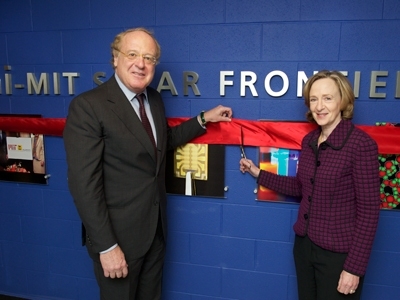MIT President Susan Hockfield and Paolo Scaroni, CEO of the Italian energy company Eni, today celebrated the opening of the Eni-MIT Solar Frontiers Center (SFC), headquartered on the MIT campus, which promotes research in advanced solar technologies through projects ranging from new materials to hydrogen production from solar energy.
Hockfield said that the center’s aim is to develop solar technologies that can be competitive with other energy sources, without the need for any government subsidies. “This center has the potential to fundamentally transform how the world produces and uses energy,” she said.
Scaroni said his company, which is primarily an oil and gas production company, has three basic reasons for making a serious commitment to the future of solar energy. First, he said, the world’s supply of oil will eventually run out, and it is important to prepare for that post-oil future. Second, because there is such an abundance of solar energy raining down on the world every day, “we always thought that solar energy is what is going to replace hydrocarbons.” And third, the technologies for solar energy collection currently being used around the world “seemed to us very inefficient,” so there is substantial room to make major advances.
After spending a couple of hours being briefed on the solar research at MIT and touring some of the labs, Scaroni said that “if only 10 percent of what I’ve seen here materializes, this research will change the world.”
The center began with an alliance signed in February 2008 between Eni and MIT. Over the first two years, the center has produced significant scientific and technological breakthroughs in areas that include construction of the first ultra-flexible solar cell; development of the first solar cell printed on paper; advances in the production of virus-based metal contacts for solar cells; development of solar cells that mimic the photosynthetic process; advances in the understanding of how photosynthesis splits water molecules; and construction of a prototype for a new type of solar thermal plant using parabolic mirrors for concentrating solar power.
In addition to the Solar Frontiers Center, Eni supports projects in energy research at MIT on traditional hydrocarbons, methane hydrates, global climate change and transportation options. The alliance with MIT has a duration of five years and involves a financial commitment from Eni for $50 million in total, equally distributed between the Solar Frontiers program and other projects of the MIT Energy Initiative (MITEI) — the research group responsible for the study of solutions aimed at transforming the energy system to meet the challenges of the future, of which Eni is a founding member.
The partnership with MIT is the most important of the various strategic alliances and scientific collaborations signed by Eni with universities and centers of excellence worldwide. In 2007, Eni launched the Eni Award to develop improved uses of renewable energy, promote environmental research and cultivate new generations of researchers. This year, Professor Angela Belcher of MIT was selected as the winner in the "Energy renewable and non-conventional" section, for her innovative and fundamental studies on the development of natural systems able to convert and use energy.
Hockfield said that the center’s aim is to develop solar technologies that can be competitive with other energy sources, without the need for any government subsidies. “This center has the potential to fundamentally transform how the world produces and uses energy,” she said.
Scaroni said his company, which is primarily an oil and gas production company, has three basic reasons for making a serious commitment to the future of solar energy. First, he said, the world’s supply of oil will eventually run out, and it is important to prepare for that post-oil future. Second, because there is such an abundance of solar energy raining down on the world every day, “we always thought that solar energy is what is going to replace hydrocarbons.” And third, the technologies for solar energy collection currently being used around the world “seemed to us very inefficient,” so there is substantial room to make major advances.
After spending a couple of hours being briefed on the solar research at MIT and touring some of the labs, Scaroni said that “if only 10 percent of what I’ve seen here materializes, this research will change the world.”
The center began with an alliance signed in February 2008 between Eni and MIT. Over the first two years, the center has produced significant scientific and technological breakthroughs in areas that include construction of the first ultra-flexible solar cell; development of the first solar cell printed on paper; advances in the production of virus-based metal contacts for solar cells; development of solar cells that mimic the photosynthetic process; advances in the understanding of how photosynthesis splits water molecules; and construction of a prototype for a new type of solar thermal plant using parabolic mirrors for concentrating solar power.
In addition to the Solar Frontiers Center, Eni supports projects in energy research at MIT on traditional hydrocarbons, methane hydrates, global climate change and transportation options. The alliance with MIT has a duration of five years and involves a financial commitment from Eni for $50 million in total, equally distributed between the Solar Frontiers program and other projects of the MIT Energy Initiative (MITEI) — the research group responsible for the study of solutions aimed at transforming the energy system to meet the challenges of the future, of which Eni is a founding member.
The partnership with MIT is the most important of the various strategic alliances and scientific collaborations signed by Eni with universities and centers of excellence worldwide. In 2007, Eni launched the Eni Award to develop improved uses of renewable energy, promote environmental research and cultivate new generations of researchers. This year, Professor Angela Belcher of MIT was selected as the winner in the "Energy renewable and non-conventional" section, for her innovative and fundamental studies on the development of natural systems able to convert and use energy.






